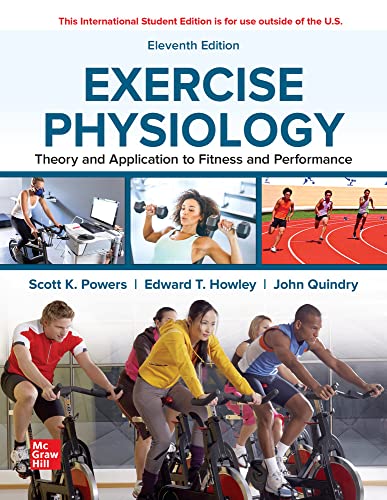Synopsis :
Exercise Physiology: Theory and Application to Fitness and Performance is designed for students interested in exercise physiology, clinical exercise physiology, human performance, kinesiology/exercise science, physical therapy, and physical education. The text provides students with an up-to-date understanding of the physiology of exercise through the use of numerous clinical applications. The comprehensive text provides instructors with the freedom to select material that is the most important for their courses. The eleventh edition has undergone major revisions, with Dr. John Quindry bringing even more expertise to the author team.
McGraw-Hill Connect® is a subscription-based learning service accessible online through your personal computer or tablet. Choose this option if your instructor will require Connect to be used in the course. Your subscription to Connect includes the following:
SmartBook® - an adaptive digital version of the course textbook that personalizes your reading experience based on how well you are learning the content. Access to your instructors’ homework assignments, quizzes, syllabus, notes, reminders, and other important files for the course.
Progress dashboards that quickly show how you are performing on your assignments and tips for improvement.
The option to purchase (for a small fee) a print version of the book. This binder-ready, loose-leaf version includes free shipping.
À propos des auteurs:
Scott K. Powers is a Distinguished Professor and the UAA Endowed professor in the Department of Applied Physiology and Kinesiology at the University of Florida. Powers enjoys teaching and has earned three University of Florida teaching awards. Dr. Powers’ research has focused on exercise-mediated changes in cardiac and skeletal muscle antioxidant systems and the role that these changes play in providing protection against oxidant injury. Further, he is actively investigating the mechanisms responsible for respiratory muscle weakness in patients subjected to prolonged periods of mechanical ventilation. Dr. Powers’ laboratory work has been funded by grants totaling more than five million dollars from the National Institutes of Health, American Heart Association, American Lung Association, and the Florida Biomedical Research Program. This research has resulted in over 180 peer-reviewed research publications. Scott has also co-authored four college textbooks for use in exercise physiology and fitness courses. Powers is active in both the American Physiological Society and the American College of Sports Medicine. He also serves as an Associate Editor for the American Journal of Physiology-Reg. and is a member of the editorial board for the Journal of Applied Physiology, the International Journal of Sports Medicine, and the International Journal of Sport Nutrition and Exercise Metabolism. Scott Powers received his bachelor’s degree in physical education from Carson Newman College, his master’s degree in exercise physiology from the University of Georgia, and a doctorate (EdD) in exercise physiology from the University of Tennessee. Powers earned a second doctoral degree (PhD) in physiology from Louisiana State University.
Edward Howley received his BS degree from Manhattan College and his MS and PhD degrees from The University of Wisconsin, Madison. He completed a one-year post-doctoral appointment at Penn State University and began his career at the University of Tennessee in 1970. He taught a variety of courses in physiology, exercise physiology and fitness testing and prescription over 36 years. He also served as an administrator of the Exercise Science program/department. He retired in 2007 and holds the rank of professor emeritus. He has received several awards for his teaching. Most of Dr. Howley’s volunteer efforts have been with the American College of Sports Medicine, where he served as president from 2002–2003. He is the Editor-in-Chief of ACSM’s Health & Fitness Journal, and is chair of the program planning committee for the annual ACSM Health & Fitness Summit meeting.
John Quindry is a Professor, Chair, and International Heart Institute Research Fellow at the University of Montana, Missoula MT. Quindry has an educational background in exercise physiology (BS, MS at Illinois State University) and a PhD in Biomedical Sciences (emphasis: Physiology) from the Quillen College of Medicine as East Tennessee State University. Quindry also completed an NIH-funded postdoctoral fellowship in Exercise Biochemistry and Cardioprotection at the University of Florida under Scott Powers’ mentorship. Quindry’s teaching emphasis calls upon his experience as a clinical exercise physiologist, in addition to animal- and human-based research in the area of cardiovascular health and the prevention of chronic diseases. Quindry’s Cardio protection research laboratory at the University of Montana has been funded by a host of federal grants in addition to foundations focused on the treatment and prevention of life threatening diseases. Quindry, his student trainees, and collaborators have produced over 100 original science research papers and review publications. John has served as an Associate Editor for Medicine and Science in Sports and Exercise since 2013 and remains very active in the American College of Sports Medicine and the American Physiological Society. Quindry has a passion for teaching clinical and exercise physiology to budding health/fitness/wellness professionals in addition to future professionals in the areas of health and allied health.
Les informations fournies dans la section « A propos du livre » peuvent faire référence à une autre édition de ce titre.
![]()
